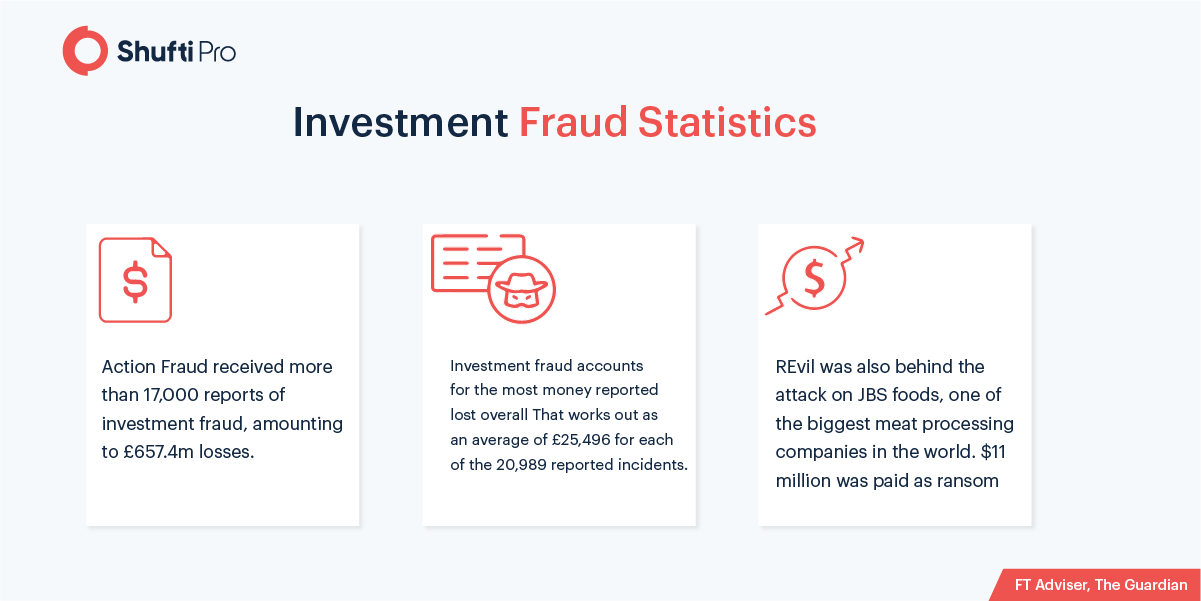Securing Investment Industry with Shufti’s Investor Verification Solution

In this tech-driven world, perpetrators and organized crime groups are adopting sophisticated methods to fulfill their illicit purposes. These entities exploit financial institutions and digital businesses to take over accounts, avail free services, and convert their illegal gains into white money. In the financial and non-financial industry, knowing who to deal with is quite important before making ties with an individual as well as corporate investors. Carrying out KYC (Know Your Customer) procedures to authenticate their identities, source of income, and market profiles are crucial due to the presence of potential risk of criminal activities.
Despite strict laws and regulatory guidelines, investment fraud is becoming the most occurring scam throughout the world. This type of fraud is most likely to increase by 50% each year. Due to the surge in investment scam incidence, it’s a growing topic of interest as businesses as well as individuals need to understand the severity of these frauds. However, investors have also routed towards digital platforms and are investing in online schemes. So here is a brief insight into different types of investors and the global regulatory framework for investors.
Understanding Sophisticated, Accredited, and Qualified Investor
According to the Securities and Exchange Commission (SEC), an investor whether a business or an individual entity is allowed to invest with securities without getting a license or registration from the SEC. Accredited investors can invest in hedge funds, crowdfunding, private placements, and equity that is unavailable for non-accredited investors. Due to this reason, such investors are significantly attractive for most companies as they can help them out to invest in unregistered schemes. In other words, the crucial purpose of accredited investors is to assist business finance by investing in securities. However, skipping the SEC requirements for company registration have a viable opportunity to make heavy profits and save filing costs.
A qualified investor is entirely dependent on the jurisdiction they are operating under and on the situation of the investment deals. Making it clear, this type of investor is a legal entity allowed to invest in private securities, placements, capital funds, and hedge funds through limited-time offers. However, with respect to accredited investors, qualified to hold more income and net worth, higher or equal to the regulatory threshold value in the respective jurisdiction. For instance, investment firms, credit card companies, financial institutions, and other various types of legal entities are considered qualified investors.
Sophisticated investors are another type that has high net worth and is considered to have comprehensive experiences as well as industry insights, altogether making them eligible for certain opportunities and advantages. However, this term also refers to an investor that has a certain degree of acumen and standing in the market. While there are various legal definitions that determine whether the entity falls under accredited or sophisticated investors. But these various jurisdictions are wise. Because of having high net cash and exceptional source of income, this type of investor is permitted to avail opportunities that are unavailable for other investors, like pre-IPO securities. In addition to this, sophisticated investors are also not required to liquefy their assets and are profoundly facing financial loss.
Investment Fraud Cases
Investment fraud is becoming mainstream as they are growing at a fast pace. Such scams happen when criminals manipulate legit investors to make them purchase assets on fake information. In addition to this, legit companies also lie to customers regarding their audits, large profits, and many other bogus statements to secure investment. Furthermore, penetrators also set up shell companies and provide false investment schemes to seek investments.

OneCoin Fraud
Cryptocurrency investment fraud cases have become an essential part of today’s headlines. In a recent one coin ponzi scam, global investors lost huge amounts as well as millions worth of cryptocurrencies. These false schemes started with a digital currency called one coin which looked fascinating and convincing, marketed as bitcoin’s biggest rival, promising guaranteed returns. Under this false scheme, the British people invested more than EUR30 million in the first six months of 2016. In reality, this coin offering lacked legality, accountability, and credibility. In addition to this, this was not to be traded. Due to this, the pricing and value spike was under investors’ command. This fraud was also operated through a pyramid scheme, as the founder was selling this coin to entities associated with multi-level marketing schemes, who tricked victims into purchasing it.
Boiler Room Scam
Michael Nascimento and his co-conspirator operated boiler room fraud for more than four years. The victims were penetrated through cold calls and were fantasized to invest in lucrative shares in a business that owns land in Madeira. The suspected assured victims return of between 125% to 228%. The victimized investors were fed with fake investment opportunities as well as false investment plans and appeared as partners with Barclays Bank. However, the investment returns are still not returned to investors, instead, their capital was invested in Nascimento’s lifestyle. This scam is considered the second largest criminal proceeding by the FCA.
Global Investor Verification Regulations
Securities Industry and Financial Markets Association (SIFMA)
The Securities Industry and Financial Markets Association has issued guidelines for licensed investment advisers and broker-dealers suggesting them to incorporate identity verification procedures when the two parties are using confirmation letters for participating in securities offering relying on Rule 506(c) the Securities Act. According to this guidance, the investing firms need to comply with this rule.
Rule 506(c) is an amendment in Regulation D required by the Jobs Act, that permits the investors to advertise investment schemes. Additionally, under this rule, each purchaser needs to be verified.
- The investor needs to maintain an account with the investment adviser or broker-dealer for up to six months
- The customers have to write to the company that money is not borrowed for investment plan as proposed in Rule 506 (c)
- In case of investing for a personal or joint account, the investor is to be report firm
- If the client is an accredited investor, under rule he is obliged to inform the company
Securities and Exchange Commission (SEC) Guidelines
Accredited investors don’t require to keep licenses or certificates of being verified, this doesn’t mean they can skip customer due diligence procedures. According to Securities and Exchange Commission (SEC) guidance, investment businesses need to authenticate every accredited investor before onboarding aimed to secure the company’s interest. The identity verification checks are capable of verifying the legitimacy of every investor. Following are key pillars of SEC guidelines;
- Gather investor personally identifiable information like name, ID number, etc
- Investors are obliged to fill questionnaires and forms to provide background information as well as other relevant documents to prove that their assets are legit
- W-2 forms, ta forms, endorsement letters from licensed advisors is to be provided
US Federal Advisers Act
The US Federal Adviser Act is legislated under SEC guidelines, restricts investment advisors and private fund managers to charging additional performance costs from the investors. But in this regard, customers need to meet the requirements for qualified investors as they are subjected to additional fees. Following are the crucial points for qualified investors;
- The investor must own assets more than $1 million managed by advisers after signing the investment contracts
- The investor is either director, executive, general partner of trustee according to section 2(a)(51)(A) defined in the Investment Company Act 1940
How Shufti Can Help
Shufti’s investor verification services are an ideal solution for financial firms as well as investment companies that are struggling to comply with regulatory obligations and secure their operations. The AI-powered solutions can robustly verify the true identities of the investors with 98.67% accuracy in less than a second.
Steps involved in Shufti’s investor verification process:
- The investor uploads their ID along with business documents
- Shufti’s expert MLROs validates investors’ documents
- Anti-Money Laundering (AML) system screens investors against 1700+ global watchlists
- Verified results are saved in clients back office
Final Thoughts
Despite multiple international regulations and efforts rendered by the investment industry, still, the number of crimes is rising on daily basis. Financial firms and other investment businesses need to assure that their investors are legit, eligible, trusted, and risk-free by assessing their market position. By implementing the Know Your Investor (KYI) process in the company’s identity verification systems, firms can onboard legitimate entities, secure their operations, and can effectively curb money laundering activities.
Have more questions on how Shufti can help you? Share your concerns with our team and get a solution as per your business needs!

 Explore Now
Explore Now













